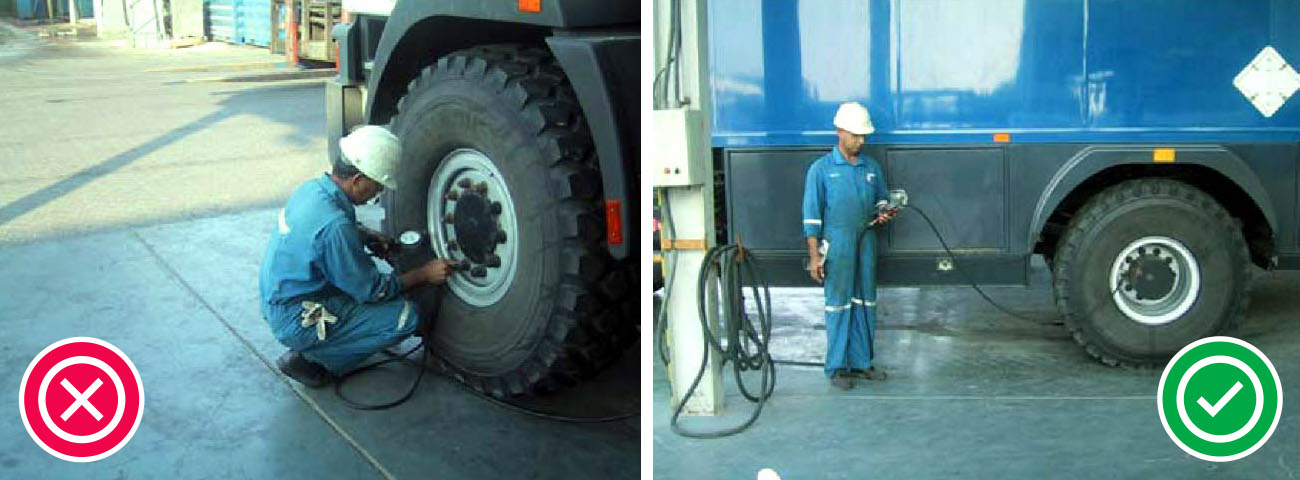Working with hoses and pressure
Working with pressure and hoses carries several risks that can lead to severe injury. The identification of the risks involved with pressure and hoses can often be missed. Lately in the oil industry there have been several such incidents, including two noted below:
Leaking Seal on Hydraulic System causes Oil Spray
One member has reported an incident which occurred recently, whereby a person got sprayed with hydraulic oil due to a leaking seal in the hydraulic system.
The oil got into his eyes, but he did not take enough time to remove all the oil from his eyes, resulting in a visit to the hospital for check-up on shore.
The lessons learnt were:
- that during pressuring or re-pressuring any system, personnel should stay at a safe distance at all times, particularly at sensitive connections (flanges, valves, repaired areas etc.);
- the need for personnel to check the relevant data sheet, which should be readily available, for correct action for the oil/chemical;
- the need to wash eyes or any other body parts extensively if exposed to oils or chemicals;
- that the effects of oils/chemicals may not apparent immediately, but may occur much later, so it is prudent to take immediate defensive action.
Fatality While Inflating Truck Tyre
A heavy-duty truck driver/operator was fatally injured while inflating the truck’s right front tyre. During inflation, the wheel lock ring flew off, hitting the operator in the face. The company involved has noted the need to maintain a safe position while carrying out such work, as illustrated in the diagrams below:

Member Notes
One member has passed IMCA its notes to employees on the subject of working with hoses and pressure as follows:
Take a moment to review the following points to help prevent any further hose related incidents.
Risks when working with or around hoses and pressure:
- Whip from hose resulting from
- A sudden release due to connection failure
- Disconnecting a pressurised hose
- Failure to use proper hose safety locks and restraints
- Sudden release due to improper fastening of connection
- Failure as a result of exceeding pressure capacity of hose
- Hose fatigue and exposure to hazardous environment
- Hose/connection manufacturing defect
- Pressure injection injuries
To prevent accidents and damage to hoses:
- Wear appropriate PPE including, hardhat, safety glasses, gloves while working with hoses.
- Use hose safety devices including pins.
- Use the corrective length and diameter of hose.
- Run the hose as specified by the manufacturer, ensuring proper support and restraint brackets.
- Replace any chafing guards that are damaged or missing.
- Do not ignore outer jacket damage. Replace hose as necessary.
- Check fittings ensuring they are in good working condition.
- Keep all air and high-pressure hoses properly coiled when not in use.
- See that couplings and valves are in good repair. Make sure ends cannot be pulled loose allowing the lines to whip around dangerously.
- High-pressure wash guns without trigger shut-off valves should not be used. Never point any high-pressure spray wand at another person.
- Compressed air blow-off guns can be dangerous. Keep gun directed away from face and use goggles to protect your eyes from flying dust particles.
- When working around steam cleaning operations always wear boots, heavy gloves and face protection to protect from burns. A shot of steam inside a pair of shoes can raise blisters. Hands that touch a hot coupling can result in painful burns.
Pressurised equipment is a potential hazard to be approached with care.
Safety Event
Published: 1 August 2003
Download: IMCA SF 09/03
IMCA Safety Flashes
Submit a Report
IMCA Safety Flashes summarise key safety matters and incidents, allowing lessons to be more easily learnt for the benefit of all. The effectiveness of the IMCA Safety Flash system depends on Members sharing information and so avoiding repeat incidents. Please consider adding safetyreports@imca-int.com to your internal distribution list for safety alerts or manually submitting information on incidents you consider may be relevant. All information is anonymised or sanitised, as appropriate.
IMCA’s store terms and conditions (https://www.imca-int.com/legal-notices/terms/) apply to all downloads from IMCA’s website, including this document.
IMCA makes every effort to ensure the accuracy and reliability of the data contained in the documents it publishes, but IMCA shall not be liable for any guidance and/or recommendation and/or statement herein contained. The information contained in this document does not fulfil or replace any individual’s or Member's legal, regulatory or other duties or obligations in respect of their operations. Individuals and Members remain solely responsible for the safe, lawful and proper conduct of their operations.
